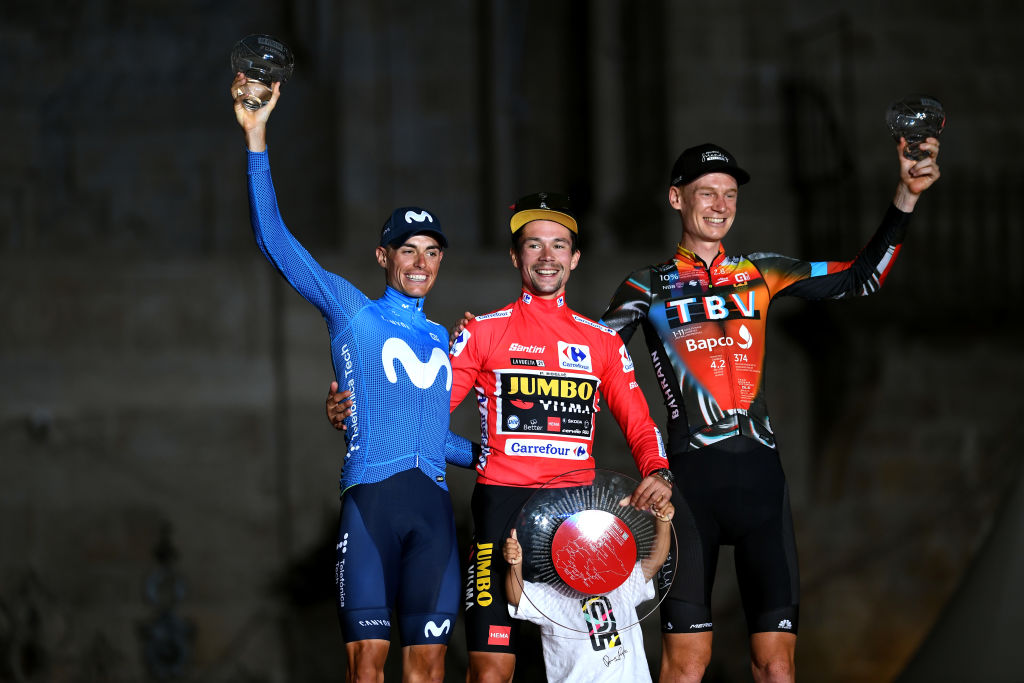Primoz Roglic triumphs in Vuelta a España for third straight year
Slovenian starts and concludes Vuelta with time trial stage wins

As it began, so it ended: Primož Roglič (Jumbo-Visma) concluded the 2021 Vuelta a España just as he started, with victory in a time trial, celebrated in front of a cathedral and with the red leader’s jersey securely in his grasp, too.
However, there was a big difference. Standing outside Santiago’s cathedral and even as his Vuelta a España came full circle with another victory, Roglič also expressed the hope that he will be back in the future to fight for a record-equalling fourth win.
“I didn’t plan it for three years and in three years I always ended up here. So I’m not sure, but I’d like to be here again and definitely enjoy it again,” Roglič said.
That, though lies in the future. As the top pre-race favourite, Roglič has now become the third rider in Vuelta a España history, after Tony Rominger (1992,1993,1994) and then Roberto Heras (2003, 2004, 2005), to take three straight wins.
He is one of only four, together with Alberto Contador (2008, 2012 and 2014) to win it three or more times and, with Contador, one of two riders to win three in three participations.
The final time trial had been touted as the deciding factor in this year’s race, but in fact it simply served to confirm Roglič’s supremacy.
Roglič opened up a gap of 20 seconds by the first check point on provisional leader Magnus Cort Nielsen, as the EF Education-Nippo racer came close to adding a fourth stage win to his palmares.
Get The Leadout Newsletter
The latest race content, interviews, features, reviews and expert buying guides, direct to your inbox!
But instead it was Roglič who racked up a fourth victory in this year’s Vuelta, starting with the opening time trial in Burgos, continuing with a triumph on the ultra-steep uphill finish in Valdepeñas de Jaén in the second, then concluding with a superb solo win at Covadonga. Last but not least, of course, came his win in Santiago de Compostela, with one highly symbolic moment coming when he blasted past Enric Mas (Movistar), within sight of the line.
Roglič’s final victory margin of 4:42 over Mas is the largest, too, in 24 years since Alex Zulle finished more than five minutes ahead of Fernando Escartin in 1997.
“That’s unbelievable, it’s crazy. Sometimes you win by a lot sometimes by a little, but as long as you win that’s what’s matters,” he told Spanish TV.
Quite apart from the results, Roglič seems to be increasingly good humoured when it comes to racing in the Vuelta, and he confirmed that as the years have gone by “for sure I’ve enjoyed it more".
"Hopefully the older you are, the happier you are,” he joked to reporters. “And I like this race, it gives me beautiful memories that I will have for my whole life.”
Comeback from the Tour de France
Behind the latest victory in the Vuelta a España, of course, there’s been Roglič’s remarkable comeback from the Tour de France. If the fightback after the 2020 race and the setback of the final TT was perhaps mainly a mental battle, on this occasion Roglič has had physical issues to deal with as well.
“Like I always say, life has its ups and downs and as long as you move forward, then everything comes to the right place,” Roglič reflected. “I had some really bad moments in the Tour, but it was super nice in the Olympics and I came to the Vuelta to do my best with no racing in between.”
“And again, today was a super-hard race, but the result was super-nice. And I’ve really enjoyed every day here in Spain.”
Roglič said despite his keenness to put the Tour behind him, his injuries were so bad that he had not been sure of his chances of getting to the Olympics. But get there he did, winning the time trial, and with the support of his family, he said, “it makes all this a lot easier.”
As for how he actually moves on from such setbacks, Roglič said he did a really hard block of training before the Tour, but afterwards he “needed to step out and go off, I needed a holiday. So I went off, but then I focussed again on a new course and new goals. I’m a guy who works well with fast changes, and I always try to be open for help and support.”
And as he concluded in Santiago de Compostela at the end of his quest for a third win in the Vuelta, the end result was one he could certainly be satisfied with.
Alasdair Fotheringham has been reporting on cycling since 1991. He has covered every Tour de France since 1992 bar one, as well as numerous other bike races of all shapes and sizes, ranging from the Olympic Games in 2008 to the now sadly defunct Subida a Urkiola hill climb in Spain. As well as working for Cyclingnews, he has also written for The Independent, The Guardian, ProCycling, The Express and Reuters.
